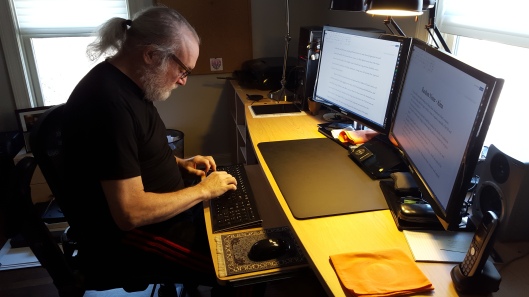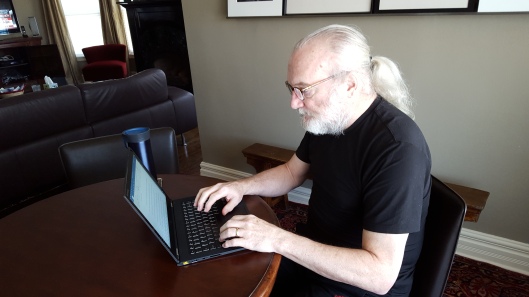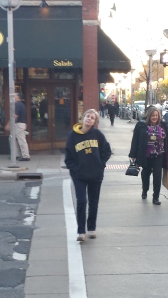My short story, “Testimony,” recently won first prize in the College of DuPage 2016 Writer’s Read Emerging Voices contest. Published in the Prairie Light Review, Vol. XXXVIII No. 2. I have posted it here for your enjoyment.
Testimony
Copyright 2016
Mr. Brody, before the day you shot the deceased, how long had it been since you discharged a weapon?
I didn’t shoot Audie Johnson.
He shot himself then?
Inadvertently, yes.
But your hand was on the weapon.
I had one hand on his wrist and I gripped the hand in which he held the gun with my other hand. We struggled and the gun fired. My fingers never went near the trigger.
You struggled with the deceased but your finger never touched the trigger.
That’s what I said.
How did you come to struggle with the deceased?
When he entered the house, I lunged at him, reaching for the pistol. I gripped his wrist with one hand and the gun hand with the other.
The other what?
My other hand.
Your wife and your mother were also in the house, is that correct?
Yes.
What were they doing while you struggled with the deceased?
Bleeding.
I beg your pardon.
They were bleeding from wounds they suffered when Johnson shot through the living room window. My wife was wounded in the upper chest and my mother sustained cuts to her face from flying glass.
Where were they at the time of your struggle with the deceased?
In the hallway at the rear of the house.
How did they get there?
I carried my wife and led my mother.
You didn’t want any witnesses to your confrontation with the deceased, did you?
I didn’t know there would be a confrontation. I was concerned for their safety.
How long had it been since you last visited your mother?
Objection, your honor. Relevance?
Sustained.
Weren’t you worried that your wife and mother would sustain additional injuries when you moved them from the living room to the hallway?
There was a lull in the shooting and when I looked out the window, Johnson was reloading his pistol. I used that as an opportunity to move them.
What did you do after that?
I called 911, reported the shooting, requested police and an ambulance, and then crept back into the living room.
Why didn’t you stay with your wife and mother?
I was fearful for their safety.
How was abandoning them in the hallway going to guarantee their safety?
If Johnson attempted to enter the house, I was going to try and stop him.
Stop him.
Yes.
How?
I had no idea. I knew my mother kept no weapons in the house.
How did you know the deceased was at the patio door?
At first I didn’t, but it was the only way he could have gained entry.
How is that?
There’s an iron fence with a locked gate at the front door. The garage can’t be opened from the outside without a door opener. That left the side gate to the yard. If he climbed that fence and entered the patio enclosure, then the side door would be the only place he could get in.
You argued with the deceased earlier that evening, didn’t you?
Not exactly.
What do you mean, not exactly?
An argument requires at least two people. I didn’t argue with him.
Thank you for the clarification. Please describe what did happen earlier that evening.
Johnson is my mother’s neighbor. She’d invited him to the house to meet my wife and me.
What was the nature of his relationship with your mother?
Objection, your honor. Relevance again.
I’ll allow it.
I don’t know anything about their relationship.
But they did have relationship?
I don’t know.
How did the meeting with you and your wife go?
He went to the refrigerator and opened a beer for himself and then the conversation turned to politics. He used a derogatory term to refer to the president.
A derogatory term?
That’s what I said.
Yes, of course. What term did he use?
He called him a raghead n-word.
Raghead n-word. What exactly did he say?
Objection, your honor. Is this necessary?
Sustained. Counselor, we all know the word Mr. Johnson used. Move on.
Sorry, your honor. So he used the n-word, which made you angry. Is that accurate?
Not entirely.
What do you mean?
I felt angry, yes, and disappointed.
You were disappointed?
That people still use the word, and that Johnson specifically used it in referring to the president.
Did you vote for the president?
Objection, your honor.
Goes to motive, judge.
Sustained. A different line of questioning, counselor.
What happened after the deceased used the n-word?
I told him I didn’t care for the term.
What was his reaction?
He laughed and said it a few more times in succession.
And did that make you angrier?
No.
Then what did you do?
I told my mother that my wife and I were going into our bedroom, and would she please let us know when Johnson had left.
You simply left the room?
Yes.
You didn’t argue with the deceased?
I already said I didn’t.
I find that hard to believe.
I imagine you find many things hard to believe.
Your honor.
My Brody, please confine your testimony to answering counsel’s questions.
Sorry, your honor.
How much had you had to drink by then?
Part of one beer.
And the deceased?
I wasn’t counting.
Back to the initial gunfire. You moved your wife and mother into the hallway, called 911, and then returned to the living room. Is that correct?
Yes.
What did you do after that?
I waited.
Waited for what?
For what Johnson would do next.
How did you know what he would do next?
I didn’t.
But you were preparing for something, weren’t you?
No.
Please describe your actions as they led up to the shooting of the deceased.
When I left the hallway and returned to the living room, I crept to the window and looked outside, but didn’t see Johnson. That’s when I worried he’d try to climb the fence. I moved to the side door and stood beside it, flat against the wall.
Was the door locked?
He had a key.
The deceased had a key to the door?
Yes. My mother had given it to him to use in emergencies.
Was he a frequent guest at your mother’s?
I don’t know.
Why don’t you know?
Objection. Relevance. Counsel is fishing again.
Sustained. I told you to move on from this line of inquiry.
So the deceased let himself in with a key your mother had given him.
Yes.
How did he manage the mechanics of using a key and holding a pistol at the same time?
I was on the other side of the door, so I don’t know.
It seems it would be awkward to juggle both the key and the handgun.
Okay.
When the deceased opened the door, what did you do?
At first I remained still.
You just stood there?
Yes.
What were you waiting for?
For him to come in.
He didn’t enter immediately?
No. I suppose he might have been putting the key back in his pocket.
So you waited. Then what?
He stepped from the patio into the living room, holding the gun in his right hand.
You saw the gun?
It was the first thing I saw as he stepped in. He was holding it out in front of him.
Then what did you do?
As I said earlier, I lunged at him, grabbing his wrist with one hand, and the hand holding the gun with my other.
And that’s when you, when the gun fired.
Yes. I pushed him against the door when I lunged. The barrel of the gun slammed into his abdomen and fired.
What did you do then?
I retrieved the gun from where he’d dropped it and placed it on the dining room table.
Did you offer any assistance to the deceased?
I checked his pulse. He was dead.
What did you tell the police when they arrived?
Just what I’ve testified today.
Do you feel responsible for Audie Johnson’s death?
No.
No?
Objection, your honor. Asked and answered.
Sustained.
You feel no culpability about this man’s death?
Objection.
Sustained, counselor.
You have a very convenient conscience, Mr. Brody.
Your honor!
Withdrawn. You put the gun on the dining room table, correct?
Yes.
I assume that’s why your fingerprints were found on the weapon.
I suppose.
And you never touched the trigger, but that’s where I’m confused again, Mr. Brody. I’m confused by how your fingerprints got onto the trigger guard and onto the trigger itself. How do you explain that?
Nothing to say, Mr. Brody? You testified you never touched the trigger, but your prints were found on it. Forgive my irritating confusion, but can you help me with this? Can you clarify for me why the evidence contradicts your testimony? What exactly is your explanation for this inconsistency, for this irregularity in your testimony?


 Then it’s revision time. Sitting at the small round table in our front room, beside the picture window that overlooks the park across the street with its pond. A few weeks ago my vista included ice skaters, but now the ice has melted and geese skid onto the pond’s surface as they pause in their journey north.
Then it’s revision time. Sitting at the small round table in our front room, beside the picture window that overlooks the park across the street with its pond. A few weeks ago my vista included ice skaters, but now the ice has melted and geese skid onto the pond’s surface as they pause in their journey north.
 nd the park, and among their residents live some of my closest friends. We’ve lived on Prince Pond for 26 years and have seen people move in and move away during that time. There’s a self-selecting quality to people who choose to live across the street from a public space. The loss of a degree of privacy accompanies the enjoyment of the area. Each spring and summer children and adults alike fish from the path that rings the pond. In winter, the park district waits for the ice to freeze to a suitable depth and then plows and polishes the surface for the ice skaters who proliferate. Long-term residence here can tempt one into feeling a bit proprietary about the view, about the property itself…”I
nd the park, and among their residents live some of my closest friends. We’ve lived on Prince Pond for 26 years and have seen people move in and move away during that time. There’s a self-selecting quality to people who choose to live across the street from a public space. The loss of a degree of privacy accompanies the enjoyment of the area. Each spring and summer children and adults alike fish from the path that rings the pond. In winter, the park district waits for the ice to freeze to a suitable depth and then plows and polishes the surface for the ice skaters who proliferate. Long-term residence here can tempt one into feeling a bit proprietary about the view, about the property itself…”I t’s my park!” That sense of community is what I had hoped to inject into the creation of Iske Park as the setting for those three novels.
t’s my park!” That sense of community is what I had hoped to inject into the creation of Iske Park as the setting for those three novels. iece’s birthday is in a week and her mother confided to me that what she wanted was a short story about herself. I’ve never received such a request before and thought at first I would not be up to the task, because I don’t write either children’s or YA fiction. While considering how to let her down as tenderly as possible, a plot occurred to me, along with some themes I thought she might find pertinent. So the next day I set aside my usual fiction-writing time and began this short story.
iece’s birthday is in a week and her mother confided to me that what she wanted was a short story about herself. I’ve never received such a request before and thought at first I would not be up to the task, because I don’t write either children’s or YA fiction. While considering how to let her down as tenderly as possible, a plot occurred to me, along with some themes I thought she might find pertinent. So the next day I set aside my usual fiction-writing time and began this short story.

 for a variety of reasons. What I want is a monthly meeting of a few accomplished, creative and imaginative writers, who would enjoy spending an hour or two talking about writing. Perhaps using the group as a sounding board for works in progress. or not. To talk shop. To find kindred souls. I know the virtual world provides analogous outlets, but online groups can’t provide the eye-to-eye connection. My wife is an excellent photographer and enjoys a creative group of other photographers. When they meet they share recent work, explore the nature of creativity in their art, and appreciate one another’s input.
for a variety of reasons. What I want is a monthly meeting of a few accomplished, creative and imaginative writers, who would enjoy spending an hour or two talking about writing. Perhaps using the group as a sounding board for works in progress. or not. To talk shop. To find kindred souls. I know the virtual world provides analogous outlets, but online groups can’t provide the eye-to-eye connection. My wife is an excellent photographer and enjoys a creative group of other photographers. When they meet they share recent work, explore the nature of creativity in their art, and appreciate one another’s input.